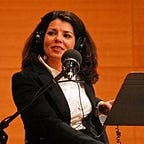Let’s kill these four standards of journalism
This is the transcript of a lecture I delivered last month while accepting the AP-Eunson Distinguished Lecturer Award at my undergraduate alma mater, Northern Arizona University. The ceremony is a joint endeavor between the Associated Press and the School of Communications.
Once you’ve read the entire speech, I think you’ll understand why I felt a little nervous about delivering these remarks to the students and faculty. To be honest, I felt quite anxious and many times, while speaking, paused to ask myself, “Should I really read this next part?”
To my surprise, the speech was greeted with enthusiasm and heartfelt support. So, I present it to you as well, hoping it finds another receptive audience.
I want to begin with a cautionary note. I didn’t study journalism while in school. I was a music major here at Northern Arizona University and later earned a Master’s in Music from the University of Michigan. I performed professionally as an opera singer for years and never once considered taking a job as a journalist.
My first job in radio was as a weekend classical music host at KNAU, the public radio station that serves north and central Arizona including the Navajo and Hopi reservations. I began reporting just a few months after taking the job when an NPR producer offered to train me; I then…
